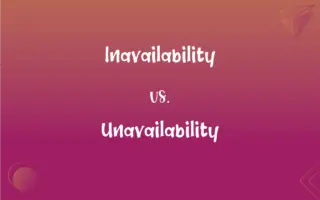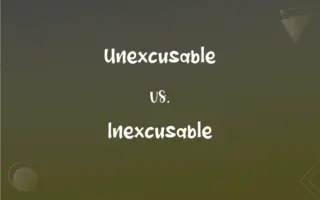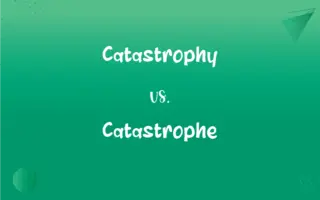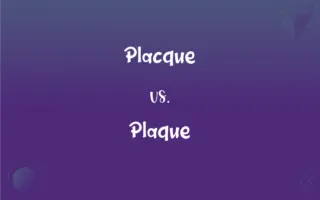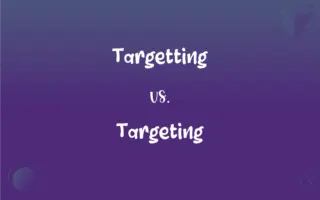Imediate vs. Immediate: Mastering the Correct Spelling
Edited by Aimie Carlson || By Harlon Moss || Updated on March 8, 2024
"Imediate" is incorrect; the correct spelling is "Immediate." Immediate means occurring or done at once; instant.

Which is correct: Imediate or Immediate
How to spell Immediate?

Imediate is Incorrect

Immediate is Correct
ADVERTISEMENT
Key Differences
Remember "Immediate" has two "m's" like "moment," signifying something happening right now.
Associate "Immediate" with "immediately," its adverb form, both having double "m."
Recall "Immediate" has "media" in it, suggesting rapid information delivery.
Think of "Immediate" as "I'm mediate," indicating no mediation or delay.
Link "Immediate" with "immediate action," emphasizing quick response.
ADVERTISEMENT
Correct usage of Immediate
The response was imediate after the accident occurred.
The response was immediate after the accident occurred.
They noticed an imediate change in the weather conditions.
They noticed an immediate change in the weather conditions.
The imediate effect of the medicine was a relief from pain.
The immediate effect of the medicine was a relief from pain.
He felt an imediate need to apologize for his mistake.
He felt an immediate need to apologize for his mistake.
Her imediate reaction was to call for help.
Her immediate reaction was to call for help.
Immediate Definitions
Directly connected with or very close to something.
The immediate cause of the accident was unclear.
Nearest in space or relationship.
He sat in the immediate vicinity of the speaker.
Occurring or done at once; instant.
The patient required immediate attention.
Existing or occurring now.
Her immediate concern was her family's safety.
Requiring quick attention; urgent.
The situation called for immediate action.
Occurring at once; happening without delay
Needed immediate treatment for the injuries.
Of or near the present time
In the immediate future.
Immediate Sentences
The news had an immediate impact on the stock market.
His immediate thought was to protect his sister.
The immediate area around the school was evacuated for safety.
She had an immediate response to the treatment.
The immediate surroundings were quiet and serene.
We need an immediate solution to this problem.
They felt an immediate connection when they met.
He sought immediate shelter from the rain.
The immediate consequences of his actions were severe.
I had an immediate sense of déjà vu.
There was an immediate outcry from the community.
Her immediate family members were all present.
The immediate need for assistance was evident.
Her immediate priority was her family's well-being.
They issued an immediate recall of the product.
The immediate aftermath of the disaster was chaos.
She made an immediate decision to change her plans.
The fire required immediate attention.
The movie's release was postponed with immediate effect.
The game was suspended with immediate effect.
The immediate cause of the accident was driver error.
The immediate vicinity was searched for clues.
He took immediate action to correct the mistake.
There was no immediate threat to the public.
The company's immediate future looked promising.
Immediate Idioms & Phrases
Immediate vicinity
The area directly around a particular place.
The police searched the immediate vicinity for clues.
Immediate effect
Something that happens right away.
The new law goes into effect with immediate effect, starting today.
Immediate action
Taking action right away without delay.
The situation calls for immediate action to prevent further damage.
Immediate cause
The direct cause of an event or situation.
Investigators determined the immediate cause of the fire was faulty wiring.
Immediate impact
The direct effect something has right away.
The CEO's resignation had an immediate impact on the company's stock.
With immediate effect
Happening right now or from this point forward.
The director resigned with immediate effect.
Immediate surroundings
The area or environment directly around someone or something.
They were unaware of the danger in their immediate surroundings.
Immediate family
Your closest relatives, such as parents, siblings, spouse, and children.
Only immediate family were invited to the small wedding ceremony.
Immediate response
A reply or reaction that happens right away.
An immediate response is required in emergency situations.
Immediate attention
Urgent focus or consideration on a matter.
The injured were given immediate attention by the medical team.
Immediate gratification
The desire to experience pleasure or fulfillment without delay.
Society's focus on immediate gratification can lead to impulsive decisions.
Immediate access
The ability to reach or obtain something right away.
Patients should have immediate access to essential medicines.
Immediate future
The very near future.
In the immediate future, we plan to expand our product line.
Immediate predecessor
The person who held a position or role just before the current holder.
The current president's policies are quite different from those of her immediate predecessor.
Immediate concern
Something that needs urgent attention.
Our immediate concern is to ensure everyone's safety.
Immediate dismissal
Being fired or dismissed from a job or position right away.
Gross misconduct will result in immediate dismissal.
Immediate need
A requirement or necessity that is urgent.
The disaster victims have an immediate need for food and water.
Immediate priority
The most important thing that needs to be dealt with or done first.
Ensuring the safety of our employees is our immediate priority.
Immediate threat
A danger that is present and urgent.
The approaching storm poses an immediate threat to the coastal areas.
FAQs
What is the verb form of immediate?
Immediate doesn’t have a direct verb form; it's an adjective.
Why is it called immediate?
It's called immediate, deriving from Latin 'immediatus,' meaning not intervening or without delay.
Which vowel is used before immediate?
The vowel "i" is used at the beginning of immediate.
What is the root word of immediate?
The root word of immediate is the Latin 'mediatus,' meaning 'mediate' or 'middle.'
What is the plural form of immediate?
As an adjective, immediate does not have a plural form.
Which preposition is used with immediate?
Prepositions like "in," "of," and "to" are commonly used with immediate.
What is the pronunciation of immediate?
Immediate is pronounced as /ɪˈmiː.di.ət/.
Is the word immediate imperative?
Immediate can be used in imperative sentences but is not itself an imperative.
What is the first form of immediate?
As an adjective, immediate does not have different forms.
Which conjunction is used with immediate?
Conjunctions like "and" or "but" can be used in sentences with immediate.
Is immediate an adverb?
No, immediate is not an adverb.
Is immediate an abstract noun?
Immediate is not a noun; it’s an adjective.
Is immediate a collective noun?
Immediate is not a collective noun.
What part of speech is immediate?
Immediate is an adjective.
What is the opposite of immediate?
The opposite of immediate is "delayed."
What is the second form of immediate?
Immediate remains the same; it has no different forms.
What is the singular form of immediate?
Immediate is an adjective and doesn’t have singular or plural forms.
Is immediate a negative or positive word?
Immediate is neutral; its connotation depends on context.
Is immediate a vowel or consonant?
Immediate is a word, not classified as a vowel or consonant.
What is a stressed syllable in immediate?
The second syllable "me-" is stressed in immediate.
Is immediate a noun or adjective?
Immediate is an adjective.
Is the immediate term a metaphor?
Immediate can be used metaphorically but is not inherently a metaphor.
How many syllables are in immediate?
Immediate has four syllables.
What is another term for immediate?
Another term for immediate is "instant."
Which determiner is used with immediate?
Determiners like "my," "your," or "the" are used with immediate.
What is the third form of immediate?
There is no third form; immediate is consistent in its form.
How is immediate used in a sentence?
Example: "The news had an immediate impact on the stock market."
Which article is used with immediate?
Both definite (the) and indefinite (a, an) articles are used with immediate.
Is immediate a countable noun?
Immediate is not a noun, so it's not countable.
How do we divide immediate into syllables?
Immediate is divided as Im-me-di-ate.
About Author
Written by
Harlon MossHarlon is a seasoned quality moderator and accomplished content writer for Difference Wiki. An alumnus of the prestigious University of California, he earned his degree in Computer Science. Leveraging his academic background, Harlon brings a meticulous and informed perspective to his work, ensuring content accuracy and excellence.
Edited by
Aimie CarlsonAimie Carlson, holding a master's degree in English literature, is a fervent English language enthusiast. She lends her writing talents to Difference Wiki, a prominent website that specializes in comparisons, offering readers insightful analyses that both captivate and inform.




